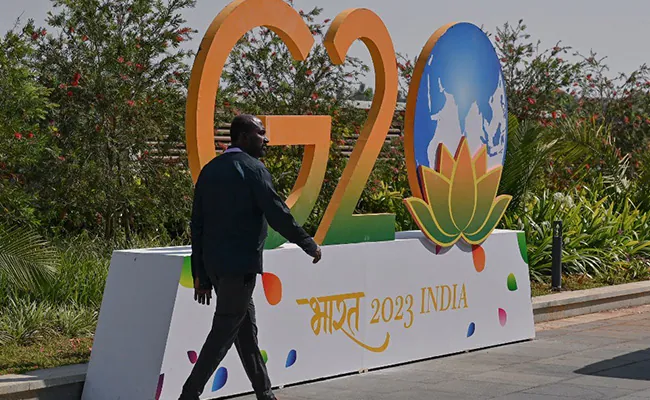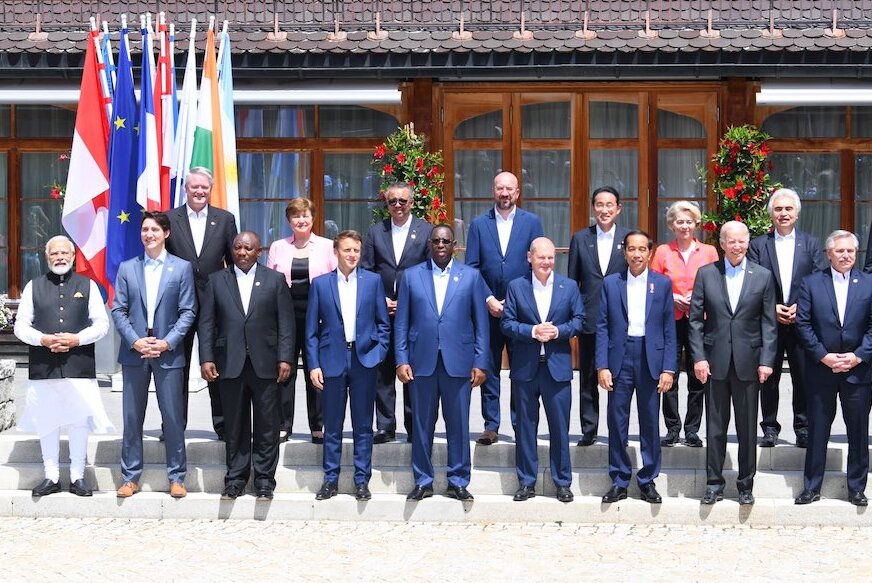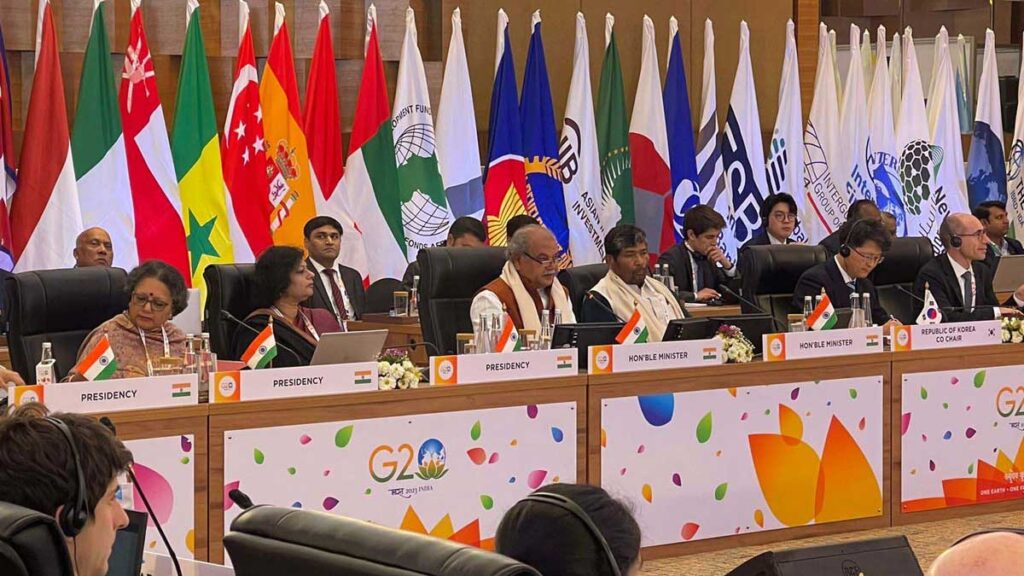India’s tryst with G20: Can India seize its moment?

Prime Minister Narendra Modi received the gavel from Indonesian President Joko Widodo as India took over the G20 presidency
India assumed the presidency of the Group of 20 nations on December 1, 2022, taking over from Indonesia. India’s presidency comes at a time of escalating global tensions coinciding with a period of geopolitical tumult and uncertainty over post-pandemic economic recovery. However, the G20 presidency offers India a significant opportunity to set global agendas, articulate policies and build consensus over critical economic, socio-political and security issues. It also offers India to play a vital role in the new global challenges, advocate its vision of multilateralism, and show its Vishwaguru moment, a Sanskrit phrase and idea, meaning the global teacher.
The leaders of the group of G20 nations will gather in New Delhi on September 9-10 for the 18th Summit at a time when many are wondering whether the G20 can serve any purpose, let alone live up to the large expectations posed on a group of countries that together account for 67 pc of the global population and 85 pc of global GDP. The world will be watching to see whether the G20 group continues to gather momentum as a global economic and peace leadership forum or is beset by conflicting priorities. Perhaps no other development has captured so much of global attention this year as the assuming of G20 presidency by India. In addition to assuming the presidency of the G-20, India also assumed the Presidency of the Shanghai Cooperation Organisation (SCO). This is therefore India’s finest hour to deploy its under-utilised moral and intellectual capital, but the big question is whether India can seize the moment.
Relevance of G20
When the global financial crisis erupted in 2008, something unexpected and unimaginable happened. The world turned to G20 and not the elite G8, now reduced to G7 due to Russia-Ukraine conflict, to call for articulated and coordinated action to avert another Great Depression. Since then, the G20 has gained as a new forum of global leadership. The elite G7 group knows that without G20, it shall become irrelevant and will lose capacity to face new challenges. The members of the G20 are Argentina, Australia, Brazil, Canada, China, France, Germany, India, Indonesia, Italy, Japan, Republic of Korea, Mexico, Russia, Saudi Arabia, South Africa, Türkiye, the United Kingdom, the United States, and the European Union.
The group’s importance is reflected by its economic strength as well as the moral strength since it is supposed to reflect the collective will of over two-thirds of the global population.
India has been a part of the G20 since it was established in 1999 as a forum for finance ministers in the aftermath of the Asian financial crisis. India is currently engaged with many G20 countries on free trade negotiation and with some it has already inked the deal. G20 is therefore of vital interest to India.
As we watch the world struggle with post-pandemic economic challenges, the ongoing conflict in Ukraine, global economic recession, soaring inflation, and various scarcities, this is India’s opportunity to take on the difficult role of a peacemaker, that will leverage its G20 presidency and convey to the world a strong message of peace from the holy land of Buddha and Gandhi. India must not miss its G20 moment and Indian Prime Minister Narendra Modi must seize the intellectual leadership of the Global South, a call that many nations have voiced. The current complex geopolitical and economic situation however makes it a challenge for India to shape the international response to multiple crises, the war in Ukraine at the top of the crises.
However, the Ukraine war risks derailing India’s G20 Agenda and broader objectives. As there is no sign of Russia relenting, and the West not giving up, time is running out for Modi to bring something constructive on the table before the G20 leaders meet in September. With Chinese peace proposal termed by the West as “Position Paper” on “slow burner” and West hardening its stance with new sanctions, and more importantly getting Russia further sucked into the war, Modi should rise above economic interest and broker a peace plan. As neither Russia nor Ukraine or for that matter the West seems to know how to come out of the war quagmire, it would be a statesmanship on part of India if it can convince Russian President Putin and Ukrainian President Zelensky to shun the war game and come to the negotiating table.
The theme selected by India for its presidency is “vasudhaiva kutumbukam,” a Sanskrit phrase that means “The world is one family.” India’s G20 presidency is a watershed moment as the country seeks to play an important role in finding pragmatic solutions to global issues. In global platforms, India has always sought to promote and endeavour to be the voice of the Global South, be it as leader of Non Aligned Movement during the cold war or as leader of G77+China developing nations in multilateral negotiations over climate change or global trade. India can therefore utilise its G20 leadership role to advance the interests of the Global South and New Delhi’s own credentials as a voice of the Global South.
As part of its presidency, in the next three months, India is on way to complete the targetted 200 meetings of different G-20 tracks in cities across the country, making Indian states stakeholders in New Delhi’s global engagement. These meetings marks some of the most significant diplomatic outreach activities that India has ever undertaken. They also follow a recent trend of India holding high-level meetings outside the capital.
G7 and India’s economic interest
There is a growing recognition in the capitals of G7 countries that the Indo-Pacific region will be the central to the 21st century, and India will be central to the Indo-Pacific, especially in their objective of countering the rapidly growing Chinese might in the region.
As the world’s largest democracy, world’s fastest growing economy and the most populous nation on earth, India has become an engine of global economic growth. India is of vital importance and its perspective will be increasingly important in the years ahead, whether in the White House or in the capitals of other major democracies in Europe. Also, India’s future trajectory will have a significant impact on the West ability to achieve its global economic, political and climate change ambitions.
So far, G7 is the most influential group of countries but they cannot ignore rising India’s influence and responsibility to the world. This is especially important when the United Nations Security Council (UNSC) has become ineffective and directionless. In the 1980s, the GDP of the G7 countries shared nearly 60 pc of the total GDP of the world. Now, it has declined to nearly 40 pc. Though India’s economy is larger than the UK, France, Italy, and Canada, its trade with G7 countries is important for India to become the world’s third largest economy at USD 10 trillion economy by 2037. In this respect India cannot afford to ignore the call from major countries to shift its stand on Russia.
While India is not an official member of this elite group, which comprises Canada, France, Germany, Italy, Japan, the United Kingdom, the United States, and the European Union, with its more than USD 3.5 trillion economy, India has already emerged a major player in international fora. For last four years now, India has been invited to G7 summits and looks like a permanent invitee to G7 Summit as a guest country. India joined the G7 summit in France in 2019, UK in 2021, Germany 2022, and Japan in May 2023.
With the G20 Presidency, India must seize the moment and spearhead constructive leadership focusing on climate action, energy security, stronger public health systems, technology for public good and the acceleration of the 2030 Sustainable Development Goals (SDGs) agenda which can be accomplished only with the cooperation of G7 countries.
A dysfunctional family
The G20 was a divided forum last year. The most prominent division concerned Russia’s war against Ukraine. If Russia’s war in Ukraine continues, and there is no sign of peace yet, the situation of global food and energy security is likely to worsen, as will supply chain disruptions and global inflation.
More than the economic, it is the political stance of both the sides that poses a bigger headache for India as it tries to strike a delicate balance between the G7 nations and Russia and increasingly also the G7 versus China. Despite G7 countries asking the international community to cooperate with the West against Russia, many G20 countries have so far resisted.
New Delhi has already faced criticism for failing to condemn Russia’s aggression and maintaining a position of neutrality. While the G20 may not be the forum for addressing security issues, India’s ties with Russia mean it could act as a mediator. Helping to achieve peace before the G20 Summit would not only improve New Delhi’s standing but it will also make it easier to move forward on economic and financial governance at the forum.
Beyond this issue too, the G20 has suffered from a lack of cohesion among the developed economies, as well as the diverging interests of developing and developed economies, on a range of global issues, be it trade and economy or climate change. With rising inflation and the looming threat of a global recession due to the ravages of the COVID-19 pandemic, the US-China rivalry, and the war in Ukraine, much-needed coordination may continue to be difficult to achieve. Given the diversity of interests among emerging economies and the different dynamics of their economies, a strong leadership is necessary for seeking points of convergence to articulate a common agenda and facilitate effective policy coordination.
Challenges and opportunities
In such a situation, India’s assumption of the G20 presidency entails both challenges and opportunities and the present leadership of India can meet the challenges, deftly and unlock opportunities for the benefit of humankind in general and India in particular.
Perhaps the most important challenge that will confront India is the mounting pressure from the West that are members of G20 to exclude Russia from the forum. Deployment of diplomatic, political, economic, and military tactics to isolate Russia by Western countries is also finding support from countries like Australia and Japan. Keeping in view its energy and defence needs, India cannot afford any move to isolate Russia because of its strategic compulsions. India has always operated under the framework of its strategic autonomy in foreign policy. Under this scenario, it devolves on India to be prepared for a deftly crafted position as it prepares to host the G20 Summit from the front.
The Russia-Ukraine crisis has caused tremendous disruptions in the supply chains of energy supplies on account of Western sanctions on Russia and blockade of supply routes coupled with the Russian ban on the supply of oil and gas to European countries. Another important challenge is of job creation and environment management, and G20 can act as a forum to exchange experiences on societal benefits and new trends in entrepreneurship, business innovation, growth of startups as unicorns, and gender progress as this collaborative approach would lead to the fresh impetus for innovative thinking.
However, to remain relevant and acceptable, the G20 will need to recognise and accept that the fruits of economic growth must be shared evenly among the poorest nations. They will also have to recognise that antipathy against globalisation is growing globally and unless globalisation bears fruits, there is going to be economic uproar all over. Although G7 and G20 have pushed for “green growth” to combat climate change, the green growth paradigm has failed to bring many countries on board. The G20 should therefore look how to allow the free flow of green growth and knowledge between environmentally advanced and poor countries.
Rebalancing strategic interest
Perhaps to attract India into their camp and get it to abandon Russia, there are rumours in various western capitals after the Summit in New Delhi, India will be invited to join the elite G7 club. Being the fastest growing economy, the largest democracy and the most populous nation on the earth, India is a natural partner for G7, but India must resist the temptation and assess its strategic interest. India’s priorities today are reform of the United Nations and not the G7 or G20. Also, India should keep in mind that Russia was dropped from G8 in 2014 and taking its place would be in a bad diplomatic taste and would hurt India-Russia relations. India should also be careful to accept invitation for joining NATO+ grouping.
The war in Ukraine has changed the dynamics of international relations for ever and the G20 nations also cannot escape themselves from the complexity and challenges. Before the Ukraine crisis, the world had thought that today’s relative calm and peace has deep structural basis. However, it was not true. The G20 must therefore adapt and adjust to the growing realities of the new world order. In addition to this, the world will have to accept that Russia will do anything to maintain its influence in regions of geopolitical and historical importance to the Russian state, and the Ukraine crisis should be seen in that context.
Ukraine war has direct effect on Europe. But Europe must keep its house in order. Europe’s oil and energy need is so big that EU has deliberately crafted a “weak and porous” clause in its sanction policy so that it can continue to benefit from Russian oil through another country. Therefore, European hypocrisy is laughable. In the 15 months since the outbreak of the war, India has emerged as a key importer of Russian crude oil and in April India became Europe’s largest supplier of refined fuels while simultaneously buying record amounts of Russian crude. India was among countries that were called “laundromats” of Russian crude oil by the EU alleging New Delhi was “circumventing sanctions”, even while all along it has been the EU members that have ramped up their imports of refined crude oil from India.
The G20 Summit, which will be held only a few months ahead of the 2024 general election in India, will be an opportunity for India to share its success stories on the global stage, and of course ruling party will try to capitalise it. Modi is a charismatic leader, and he knows that voters in the election are Indians and what matters for them is not G7 or G20 or UN reform but fair means to survive. It will depend on the leadership how it sells G20 success to the masses. The disappointing results in Karnataka assembly elections have already sent shock waves across BJP-run states and if BJP fails to retain Madhya Pradesh and recapture Rajasthan in the upcoming elections, it might bolster unity in the opposition parties and force BJP into bi-polar contest in the next parliamentary elections in 2024, which will be a disaster for the ruling party.
Sunil Prasad, is the Secretary General of Brussels based Europe India Chamber of Commerce and the views expressed here are his personal views.












